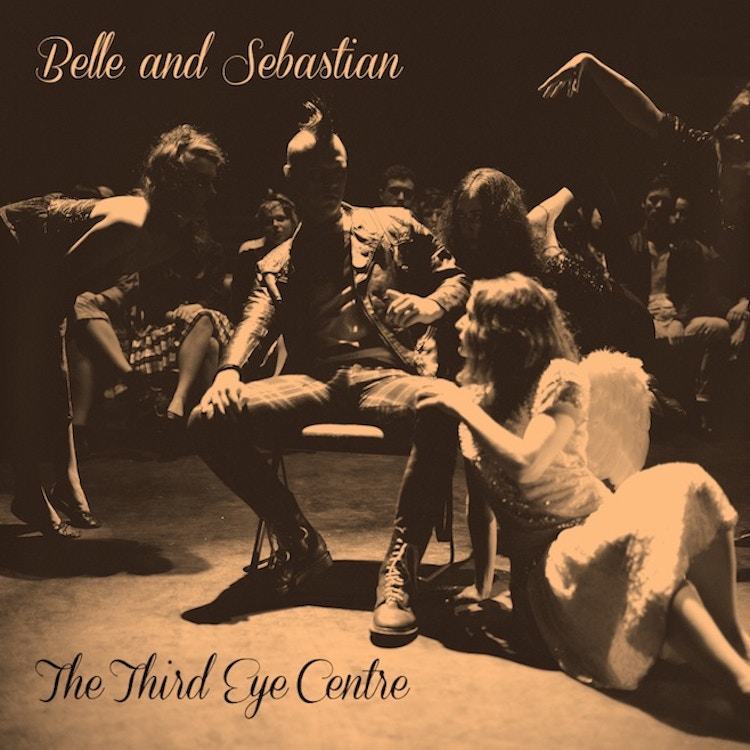Belle and Sebastian – The Third Eye Centre
"The Third Eye Centre"

One of the most endearing things about Belle and Sebastian’s peak years was their insistence on doing everything their own way. It wasn’t that they were rallying against the internet’s impact on the industry; their stand-out hat-trick of Tigermilk, If You’re Feeling Sinister and The Boy With The Arab Strap predates the transition of the web from the exclusive preserve of the computer nerd to its present-day ubiquity. As Pitchfork’s tremendous YouTube documentary on the band’s early years suggests, the refusal to release singles from albums, extremely limited press interaction and absence from their own promotional photography were all born of a desire to go back to the way things used to be, back when bands released a record a year and focused solely on their music. The release of EPs between albums was just one of a host of policies that Belle and Sebastian plucked from that era.
Push Barman to Open Old Wounds is really the gold standard when it comes to career-spanning collections of non-album cuts. Comprising the band’s classic EPs from the Jeepster era – Lazy Line Painter Jane, Dog on Wheels, 3…6…9 Seconds of Light - as well as a raft of B-sides, it served as confirmation that Belle and Sebastian represent a genuine rarity, in that some of their finest efforts were released separately from their records. The very fact that the likes of the simmeringly beautiful ‘Slow Graffiti’ and live staple ‘Legal Man’ were excluded from the period’s full-lengths indicates just how fruitful a creative time those years were, so The Third Eye Centre, which, for all intents and purposes, is Barman 2, was always going to have an awful lot to live up to.
Belle and Sebastian have yet to make a bad record, but their output over the period that The Third Eye Centre encompasses – from 2002 through to 2010 – hasn’t really come close to the halcyon days that Barman spans. They’re nothing like as prolific as they once were – a four-year gap between The Life Pursuit and Write About Love looks likely to be repeated, assuming a new LP is due next year – and the quality of their non-album output has begun to more closely resemble what you’d generally expect from B-sides. It’s little wonder that the jazz-tinged plod of ‘Long Black Scarf’ didn’t make it onto The Life Pursuit, and although ‘Mr. Richard’ does provide an answer to the question of what ‘Legal Man’ would sound like if it was faster and took on greater Latin influence, I’m not sure there was anybody asking in the first place.
There are exceptions, of course; ‘Suicide Girl’ might be the best out-and-out pop song that Stuart Murdoch’s written since ‘I’m a Cuckoo’, and the mind boggles at the fact that it was a mere bonus track on Write About Love. ‘(I Believe in) Travellin’ Light’, which continues to make sporadic live appearances, is a gentle, country-tinged effort that utilises the band’s most perennially-underrated facet – a Stevie Jackson lead vocal – whilst Murdoch’s playfully dramatic turn on the risqué ‘Meat and Potatoes’ is a neat reminder of just how well he can do tongue-in-cheek.
The inclusion of numerous remixes appears indicative of a desire to pad out the record with a little filler, as does the decision to split the retro stylings of ‘Stop, Look and Listen’ into two tracks. The Avalanches’ take on ‘I’m a Cuckoo’ is interesting enough – the chiming guitar of the original giving way to a veritable procession of African instruments – but its position as album opener is decidedly incongruous. Alternative takes on ‘Your Cover’s Blown’ and ‘I Didn’t See It Coming’, by Miaoux Miaoux and Richard X respectively, will likely only engage the most hardcore of followers, so it’s difficult to fathom quite why they made the cut whilst the band’s contributions to their own Late Night Tales compilations didn’t.
None of this should reflect negatively on Belle and Sebastian since the turn of the century – the records they’ve made during that time have been consistently excellent, and Murdoch’s vein of songwriting form has remained rich, if not quite hitting the lofty heights of the Sinister era. The problem is, it’s difficult not to judge this album against the impossibly high bar set by Push Barman to Open Old Wounds; there’s plenty to enjoy on The Third Eye Centre, but it’s considerably closer to ‘fans only’ territory than its indispensable predecessor.
Get the Best Fit take on the week in music direct to your inbox every Friday

Tunde Adebimpe
Thee Black Boltz

Julien Baker & TORRES
Send A Prayer My Way

Bon Iver
SABLE, fABLE





